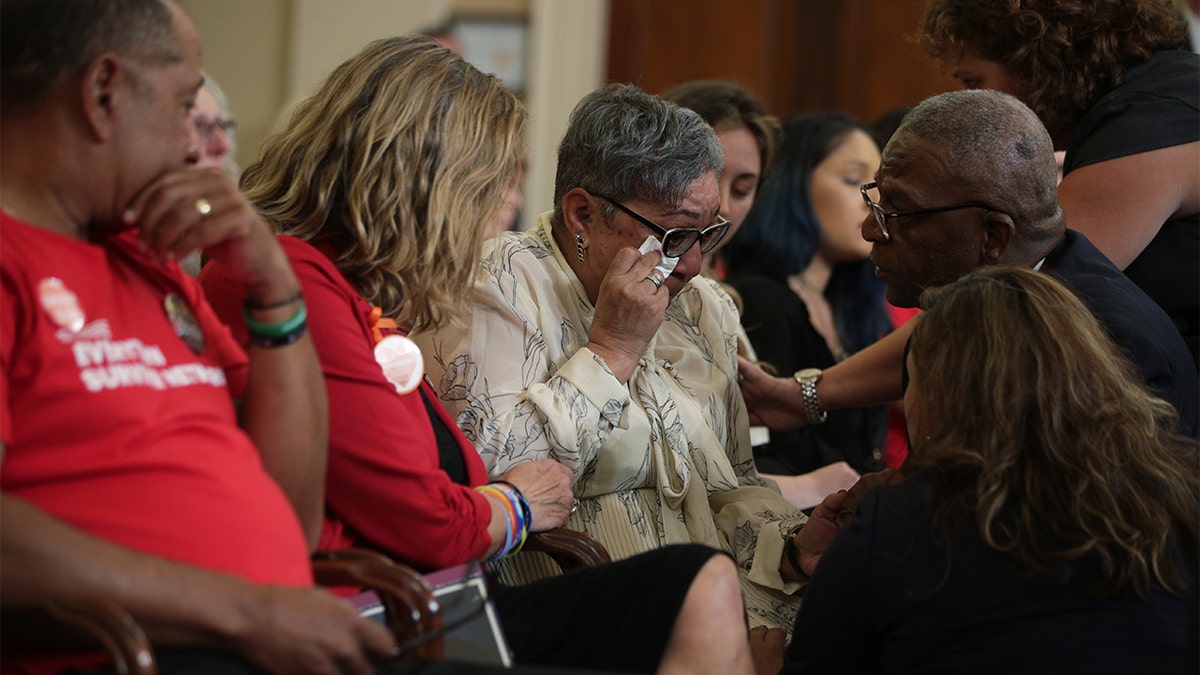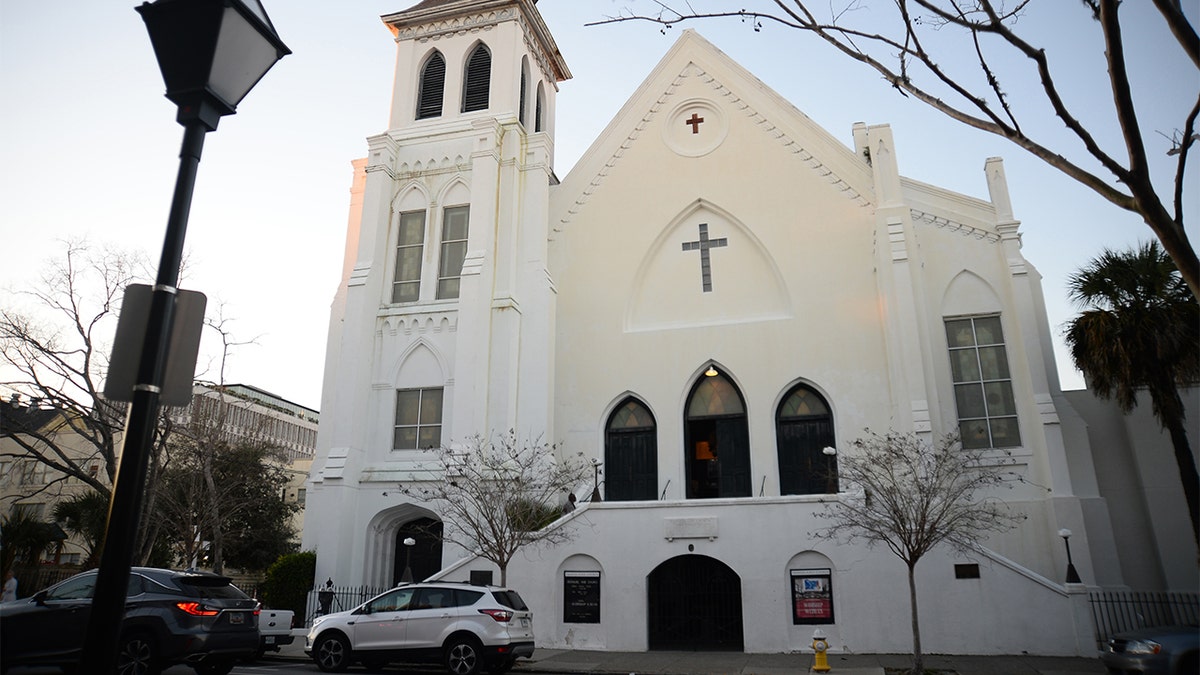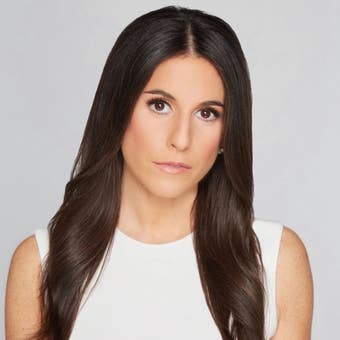Fox News Flash top headlines for October 28
Fox News Flash top headlines are here. Check out what's clicking on Foxnews.com.
The Justice Department on Thursday announced that it has reached an agreement to settle with the families and survivors of the June 2015 mass shooting at Mother Emanuel AME Church in Charleston, South Carolina.
The settlements, according to the DOJ, resolve the claims by 14 individuals that the FBI's flawed background check allowed Dylann Roof to purchase the gun he used to kill nine people. Authorities said Roof opened fire during the closing prayer of a Bible study at the church, raining down dozens of bullets on those assembled. He was 21 at the time.
"Plaintiffs agreed to settle claims alleging that the FBI was negligent when it failed to prohibit the sale of a gun by a licensed firearms dealer to the shooter, a self-proclaimed white supremacist, who wanted to start a ‘race war’ and specifically targeted the 200-year-old historically African-American congregation," the Justice Department said in a statement Thursday.
The settlements for those killed in the massacre range from $6 million to $7.5 million per claimant, and $5 million settlements for the survivors.

The Rev. Sharon Risher, who had lost mother Ethel Lance and cousins Tyzwana Sanders and Susie Jackson in the 2015 Emanuel African Methodist Episcopal Church shooting in Charleston, South Carolina, wipes tear during a gun control forum Sept. 10, 2019 on Capitol Hill in Washington, D.C. (Photo by Alex Wong/Getty Images) (Alex Wong/Getty Images)
"The mass shooting at Mother Emanuel AME Church was a horrific hate crime that caused immeasurable suffering for the families of the victims and the survivors," Attorney General Merrick =Garland said in a statement. "Since the day of the shooting, the Justice Department has sought to bring justice to the community, first by a successful hate crime prosecution and today by settling civil claims."
Associate Attorney General Vanita Gupta added that the DOJ "hopes that these settlements, combined with its prosecution of the shooter will bring some modicum of justice to the victims of this heinous act of hate."
The mass shooting took place on June 17, 2015, after Mother Emanuel congregants welcomed Roof into their church and invited him to participate in their bible study. At the close of the bible study, Roof killed nine people, including Mother Emanuel's pastor, Reverent Clementa Pinckney, also a South Carolina state senator.
The families of the Emanuel Nine, as the Justice Department describes them, as well as the five survivors who were inside the church at the time of the shooting, sued the government, seeking to recover for "wrongful death and physical injuries arising from the shooting."
"Plaintiffs asserted that the FBI’s National Instant Criminal Background Checks System (NICS) failed to timely discover that the shooter was a person prohibited by federal law from possessing a firearm," the Justice Department said. "Plaintiffs alleged that because of this delay, the shooter was able to purchase the handgun that he used to commit the atrocity."
The Justice Department said that since the shooting, the FBI has worked to "strengthen and improve the background check process."

Mother Emanuel Church site of A People's Town Hall hosted by SiriusXM Urban View's Joe Madison on Feb. 27, 2020 in Charleston, South Carolina. (Photo by Jeff Gentner/Getty Images for SiriusXM) (Jeff Gentner/Getty Images for SiriusXM)
"The department and FBI are also actively working to combat gun violence, which is a significant aspect of the department’s comprehensive violent crime reduction strategy," the Justice Department said. "After the shooting, the department prosecuted the shooter for federal hate crimes and obtained a conviction."
In 2017, Roof became the first person in the U.S. sentenced to death for a federal hate crime.
This summer, however, Garland issued a moratorium and halted all federal executions while the Justice Department conducts a review of its execution policies and procedures. The review comes after a historic run of capital punishment at the end of the Trump administration, which carried out 13 executions in six months. A federal lawsuit has also been filed over the execution protocols — including the risk of pain and suffering associated with the use of pentobarbital, the drug used for lethal injection.
Earlier this month, the court denied Roof’s request for a new hearing and also ruled against allowing a full court of substitute judges from other circuits to consider his case.
In May, a panel composed of judges from other appellate circuits heard Roof’s appeal, subsequently unanimously upholding his conviction and death sentence and issuing a scathing rebuke of Roof’s crimes, which the judges wrote "qualify him for the harshest penalty that a just society can impose."
Roof’s lawyers have argued he was wrongly allowed to represent himself during sentencing. Roof, his attorneys have said, successfully prevented jurors from hearing evidence about his mental health, "under the delusion" that "he would be rescued from prison by white-nationalists — but only, bizarrely, if he kept his mental-impairments out of the public record."
According to court documents filed in another federal case, the FBI heard two neo-Nazi group members talk about trying to free Roof from the maximum-security prison in Terre Haute, Indiana, where he is an inmate, including details on the number of guards present and how a shootout would happen.
If unsuccessful in his direct appeal, Roof could file what’s known as a 2255 appeal, a request that the trial court review the constitutionality of his conviction and sentence. He could also petition the U.S. Supreme Court or seek a presidential pardon.
Dylann Roof's chances for a new appellate hearing continue to dwindle, with a court refusing to reconsider recusing itself from his appeal over his death sentence and conviction in the 2015 racist slayings of nine members of a Black South Carolina congregation.
CLICK HERE TO GET THE FOX NEWS APP
President Biden as a candidate said he’d work to end federal executions. White House press secretary Jen Psaki said in March that he continues to have "grave concerns" about it.
Biden has connections to the case. As vice president, Biden attended the funeral for one of those slain, state Sen. Clementa Pinckney, who also pastored the congregation. During his 2020 presidential campaign, Biden frequently referenced the shooting, saying that a visit to Mother Emanuel helped him heal in the aftermath of the death of his son, Beau.
The Associated Press contributed to this report.






